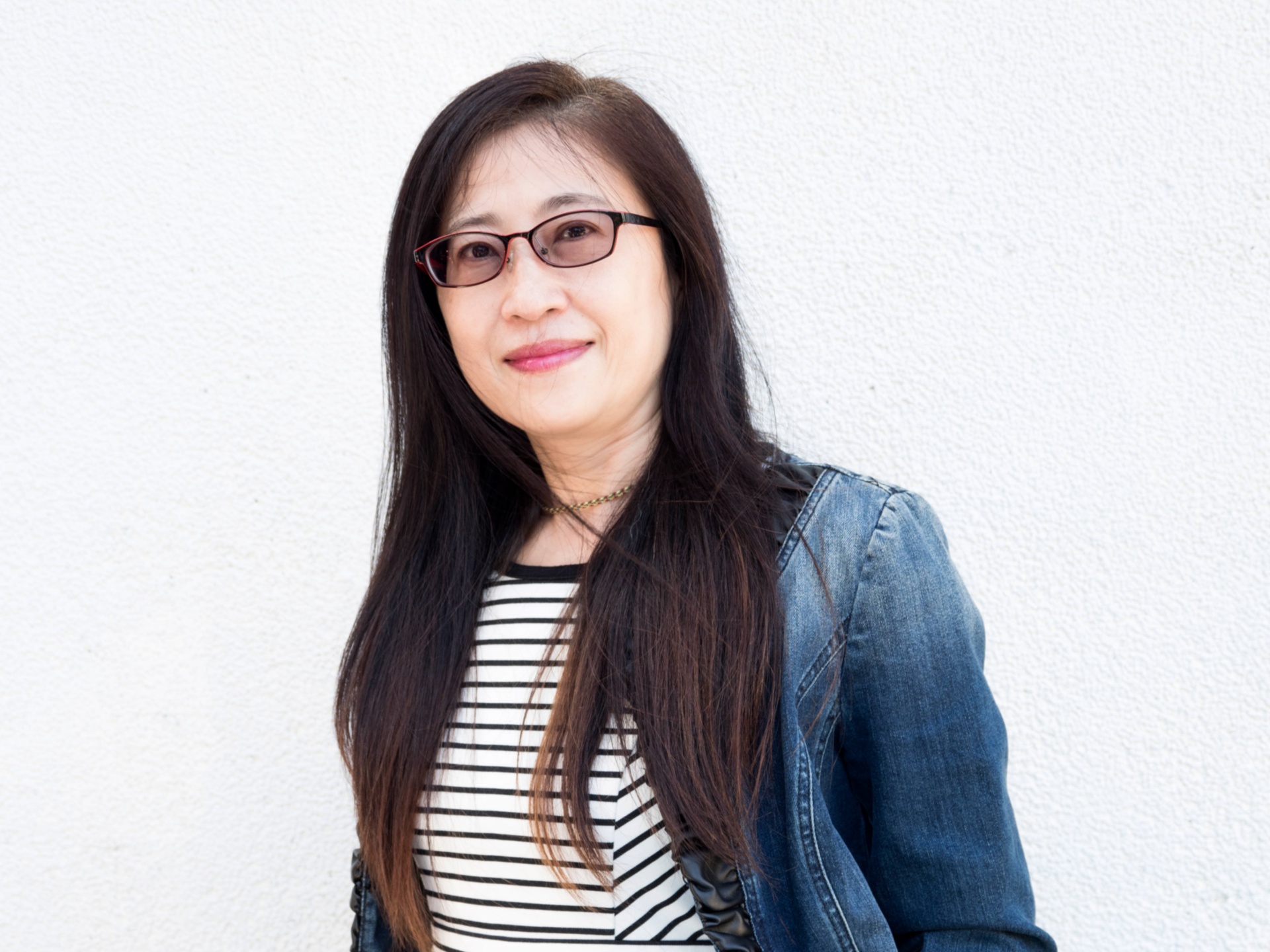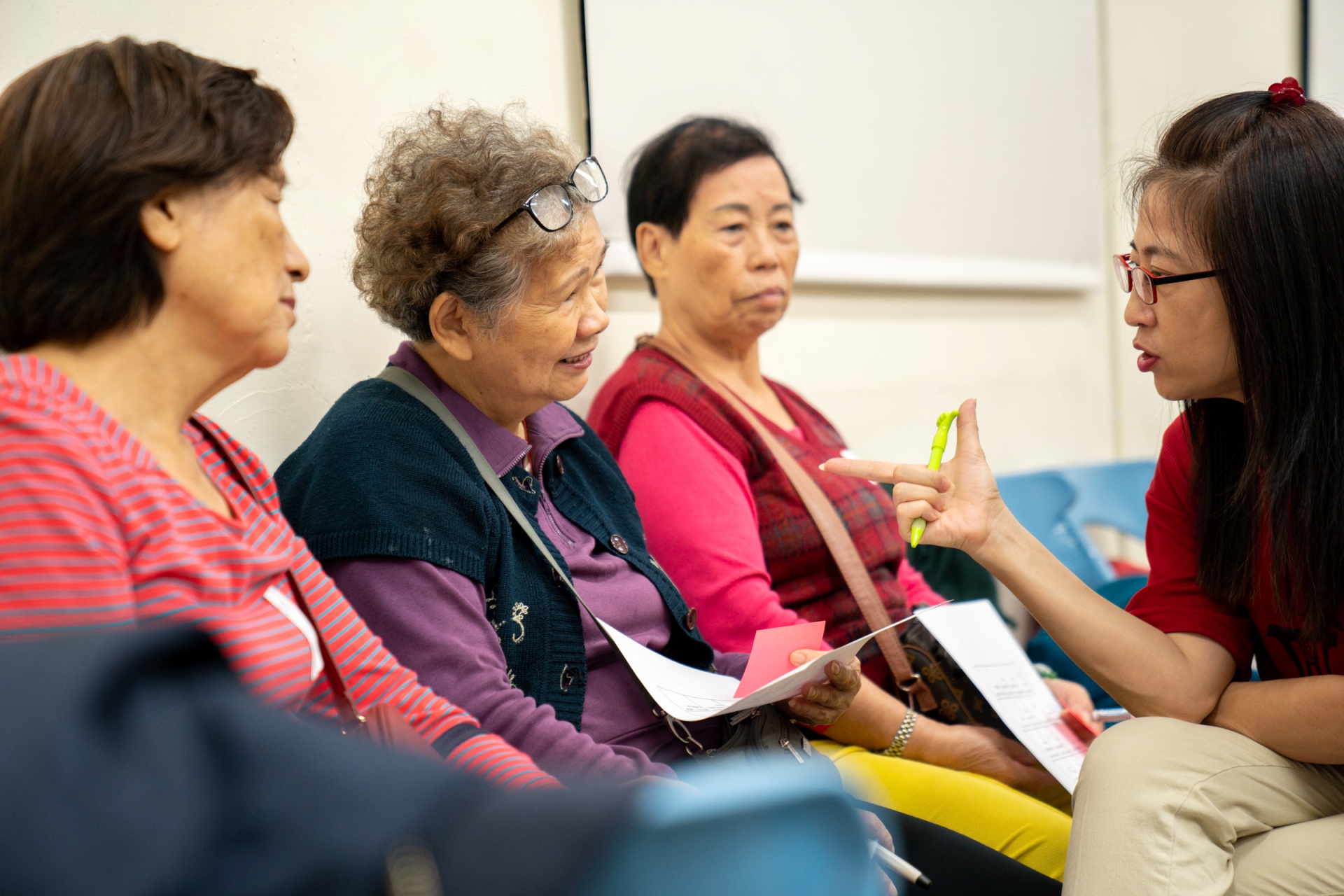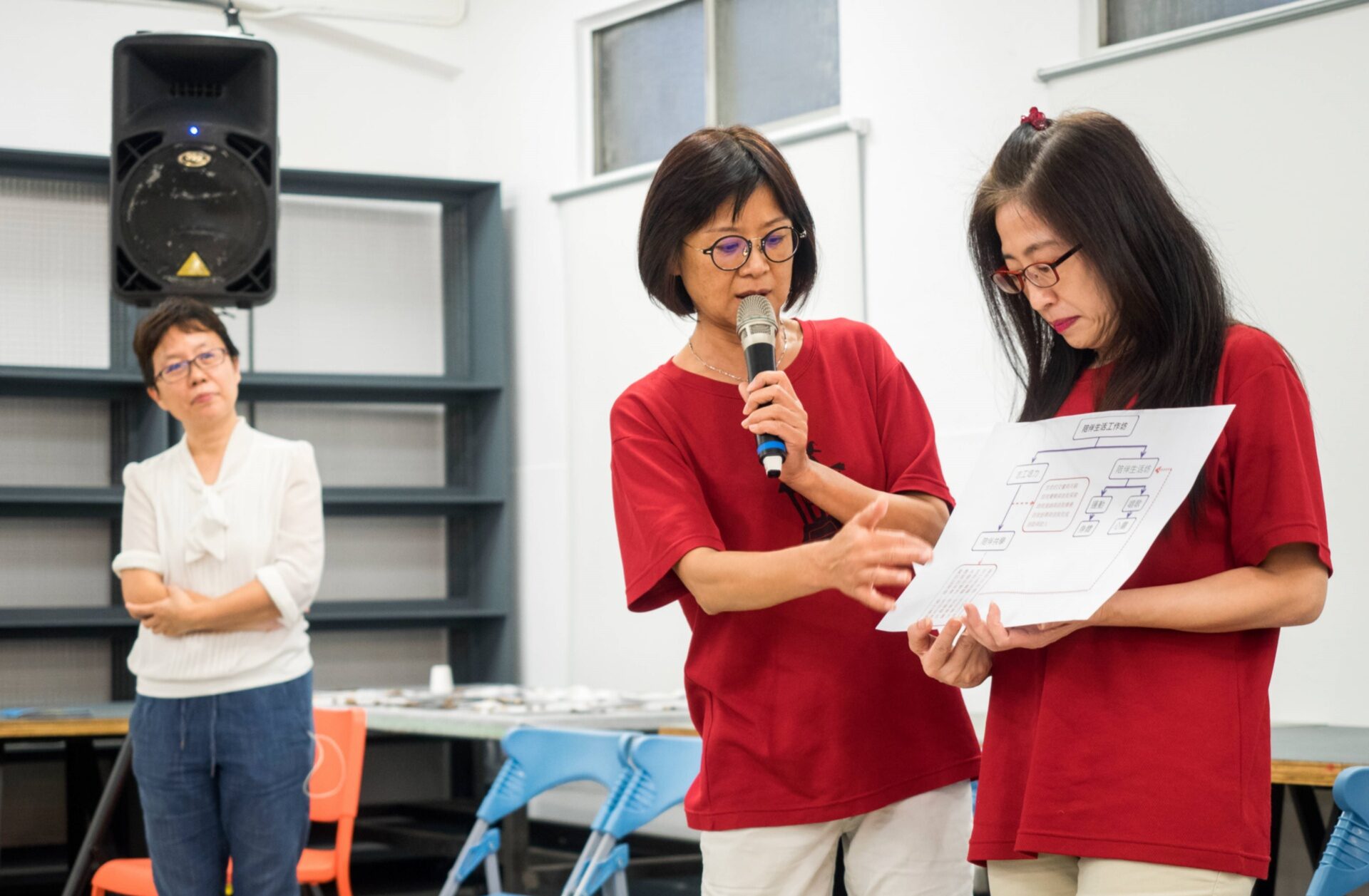女巫劇團的成員皆為北投在地的志工媽媽,她們傾聽觀眾分享的故事,再轉化為戲劇的方式呈現,雖然表演時的道具與音樂都很簡單,但卻能深刻表達出社區的活力,以及傾聽觀眾的同理心。談到女巫劇團就不能不提孕育該劇團的臺北市八頭里仁協會1,女巫劇團是由該協會「一人一故事劇場」(Playback Theatre)培訓課程所發展而成的社區劇團,因團員皆為女性且在聆聽完故事後,馬上以戲劇演繹說故事者的感受,感動敘述者的心靈,如同女巫般會施法咒,所以以北投凱達格蘭族語「Patauw」的原意「女巫居住之處」命名為女巫劇團。
1994年北投國小師生進行鄉土教學時,發現已呈現半荒廢狀態的「北投公共浴場」。此浴場建造於1913年,為日治時期臺灣婦人慈善會於1907年集資改善「湯瀧浴場」擴建而成,戰後有臺北縣議會、派出所等單位進駐,直至1989年各公家單位部門陸續撤離。師生們有感其建築與北投溫泉歷史的文化淵源,於校內發起陳情書連署活動,但沒有得到政府回應,遂將訊息傳達給在地居民,臺北市八頭里仁協會便在這樣的機緣下成立。經協會與各方努力,1997年「北投公共浴場」公告為三級古蹟。1998年臺北市政府斥資整修,「北投溫泉博物館」(溫博館)正式開館,為臺灣首座公民合營的地區特色博物館。
該協會並沒有因為溫博館的成立就結束活動,接續進行了北投古蹟踏查與導覽、發行《北投社》季刊雜誌(自1996年2月19日創刊到2014年12月10日停刊,共發行72期)、規劃植穗營(為社區高風險家庭孩子提供義務安親班與相關課外活動)與安家方案、與在地學校推行EQ教育課程,以及籌組女巫劇團。耕耘至今,協會的凝聚力與熱情可以說是社區營造的典範。
八頭里仁協會於2001年成立了社區的劇場,做了幾年演出,發現劇場經驗常隨著演出結束消失無法累積,舞臺道具與服裝製作也產生許多資源耗費。協會的理事們希望戲劇課程能延續下去,也讓社區的志工媽媽們可以透過戲劇持續活化社區的人文與歷史,2003年接觸到在社區推動戲劇教育的高伃貞老師,經過她的建議開始推動一人一故事劇場,從10月開始了一系列的培訓課程,培訓課程結束前,學員表達對此劇場形式的高度肯定,決定要讓一人一故事劇場在北投深耕,因此成立了女巫劇團。
 女巫劇團團長李靜瑜。圖/許斌攝影
女巫劇團團長李靜瑜。圖/許斌攝影
一人一故事劇場首次引入臺灣是1998年差事劇團邀請Veronica Needa來臺開設工作坊,以及2000年邀請香港譚碧琪與莫昭如來臺設工作坊。高伃貞與一人一故事劇場緣分即始於此,最初參與的團體夥伴經差事劇團扶植團練三年後,成立一一擬爾劇團,她開始進入社區開設課程建立團隊,22003年由高伃貞老師規劃帶領的「Playback劇場研習」課程,女巫劇團也因此成為臺灣首個社區型的一人一故事劇場團隊。3後來高伃貞2006年於美國一人一故事劇場學校畢業,離開一一擬爾劇團成立了悅萃坊,開始一人一故事劇場課程與培訓。至今她也長期擔任女巫劇團的課程培訓。女巫劇團團長李靜瑜提到當時他們課程上了三學期,一年半的時間,才對演出比較有自信與把握。
一人一故事劇場演出通常由一位主持人、四位表演者與一個樂手組成,演出長度90分鐘,最多可以即興演出十個短故事。主持人須具備引導與平衡技巧,如一開始的破冰,團員會先分享做示範,營造安全、放鬆與信任的關係,讓參與者願意主動分享,通常是封閉型演出能保護參與者的個人隱私。重視參與者/說故事者(teller)的內在感受,讓說故事者有說出故事的勇氣,不管是快樂的或是創傷的生命經驗,演員都會用心傾聽故事,不批評但同理。主持人與演員會抓取故事核心,隨著故事紅線(red thread)牽引主題於現場即興演出,在說故事與即興故事的過程中產生群體的共同理解,劇場成了表演者與說故事者彼此心靈療癒與共鳴的場域。
以社區為基地的女巫劇團,和一般劇團性質不大相同,大部分是公益與服務性質演出:社區、校園、醫院、長者機構或是弱勢團體。劇團每學期在北投國中與新民國中有三到五場演出,通常是高年級班級,在演出前的準備工作會先和班導訪談,了解班級學生的狀況與需求,如青春期煩惱、課業壓力、同儕霸凌、隔代教養,才會訂定演出的主題。
 女巫劇團在演出活動中與長輩們互動對話,傾聽理解長者需要。圖/臺灣當代文化實驗場提供
女巫劇團在演出活動中與長輩們互動對話,傾聽理解長者需要。圖/臺灣當代文化實驗場提供
 女巫劇團成員在「戲遊銀髮:劇做老年田野方法論壇」中,與觀眾分享交流。圖/許斌攝影
女巫劇團成員在「戲遊銀髮:劇做老年田野方法論壇」中,與觀眾分享交流。圖/許斌攝影
女巫劇團在北投也長期和許多單位合作,如老五老基金會、伊甸社會福利基金會,期望讓老人可以發夢,講夢想。2014年起參與北投社區大學的「陪伴生活工作坊」,帶領50歲以上的長者志工,一起陪伴十多位60到90歲的長者,進行老照片分享、老歌歌唱、運動等陪伴教學,也有一人一故事劇場的演出。這不只對長輩們產生影響與改變,對劇團成員也是學習。不管是工作坊或是演出,最重要的是與對象建立信任關係。李靜瑜提到在北投國小令她印象深刻的演出經驗,老五老基金會希望透過演出讓孩子更了解長輩,原本相距非常遠的兩個鴻溝世代――小學生與長者――透過一人一故事劇場產生對話與理解,原來長者的話語與情緒可以透過演出傳達給孩童,而長者看到孩子想的其實是這樣子啊!展現出跨世代老幼共融的美好風景。
女巫劇團將一人一故事劇場作為無形的禮物來給予,劇團沒有接案求生存的需求,也不是為演出而演出的社群團體,每學期請老師授課,講師費來自團員的會費。劇團如此長青,這群媽媽們的凝聚力令人佩服,團隊長期經營是不容易的事,到目前共有11位成員。她們是如何能騰出時間?一開始能參加志工的都是已婚媽媽,「感謝我們先生的薪水」李靜瑜不諱言地笑著說,大家多半是自由工作者,如講師、家教、戲劇老師或已退休,平日週五才有可能團練,週末的時間則會留給家庭。
在社區戲劇培力的路上,女巫劇團也曾經帶領過其他志工學習一人一故事劇場。2009年在陽明山為參與研習教師所做的演出,促成了培植石牌國中認輔志工成立「左手香劇團」。其實要成立社區劇團並不容易,個人經濟狀況與可運用時間、是否能長期投入學習與不斷自我精進,都是變動的因素。
女巫劇團可以說是1994年臺灣推動社區營造後所積累出的豐碩果實,從北投八頭里仁協會到社區劇場,再到女巫劇團,一人一故事劇場手法也讓參與者從他人的故事中學習傾聽與同理。這群媽媽們在社區每週五的日常團練中堅持出席、參與、學習,一路相互扶持,持續走過15年到今天。
「感謝在生命中相遇的故事。」團長李靜瑜說。